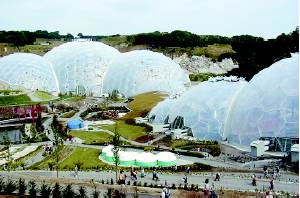Air conditioning solutions for demanding projects

Only a customised air-conditioning solution could provide the demanding environmental conditions required by The Eden Project 24 hours a day, all year round.
Customised air conditioning can be an insurance policy worth taking out says ROGER PALAMARCZUKTaking the lowest price for an air-conditioning solution might meet budgetary restraints but is not always the best policy, especially if the application is of a critical nature. Look at it as an insurance policy. Maintaining the correct condition ensures the process or function is sustained, which in turn ensures the revenue stream is not interrupted. An example of this approach was the London Eye project. This fabulous attraction generates a revenue stream as long as the wheel is turning. The design criteria put forward had to ensure the paying public got a stimulating experience, leading to another visit or recommendation. Visibility was paramount. If the glass capsules misted up on the inside leaving visitors looking through a fog, it is unlikely they would return for further visits and quite possibly submit complaints. The design criteria for summer was 30°C, 45%RH ambient to maintain 21°C, 50% RH. In winter there were two ambient conditions, the normal –4°C plus an additional severe condition of 5°C, 85%RH to cope with cold wet days. Maintaining the winter internal condition of 18°C, 50%RH requires an unusually high latent cooling system. On top of that each of the 32 capsules offered little space to work with, access to a limited power supply and exposure to the elements. If that were not enough, the design solution had to factor in carrying passengers and having doors flung open every 30 minutes! Another high-profile example is The Eden Project in Cornwall. This required vast areas to be conditioned with tempered fresh air to maintain exotic plants in an environment as close to nature as possible. AHUs were custom built to exactly fit the project’s requirements, which included small footprints and unit capacities varying from 2.5 to 7.5 m3/s. Standard units would not have been able to provide the operating capacities or cope with the demands of continuous operation. The insurance policy was to ensure the environment was maintained to allow customers to keep paying for the experience of viewing and experiencing this type of environment.
Exacting specifications Such applications cannot be addressed using off-the-shelf units, not because there is anything wrong with the products but because they are just not designed to cope with exacting performance specifications or space and weight limitations. For the vast majority of air-conditioning applications, packaged systems such as in-wall units, split systems and ceiling cassettes can do the job more than adequately. Over 70% of projects involving comfort cooling and humidification are addressed using off-the-shelf products. Food preparation areas must be maintained at 8°C in accordance with Health & Safety regulations. Turning the thermostat down on a standard split air conditioner will possibly maintain 14°C with frost protection but it will not satisfy the hygiene inspector when he calls and could result in closure. The insurance policy is to fit the right equipment first time to ensure the revenue stream. Low-temperature cassettes have been designed specifically such applications — not exactly close control but a defined environment fit for product and people. It is cheaper to build a flight simulator in a building, on the ground to duplicate the exact environmental conditions experienced on the flight, than to train pilots in the air using real, expensive aeroplanes. Flight simulators cannot be maintained using standard equipment unless the client is prepared to jeopardise the training program of the pilot and ultimately his passengers.
Myth It is a common myth that going down the customised route is a lengthy and expensive option. In fact it can be cost effective and produce the desired result first time. There is no room for error. Because a system is tailored for a specific application, prototypes are built and rigorously tested before units go into production. Customised units have to work right first time. The growth of new technologies, demand for intelligent buildings and greater controls of working environments drive the need for customised solutions. Another example, and of a particularly life-critical application, is the development of MRI body scanners. These are used for long periods and require constant cooling to prevent overheating and protect the patient inside. Space and weight restraints, varying heat loads and the use of de-ionised water required a specialist unit. Scanner cooling ensures the right diagnosis for treatment of patients.
Refurbishment Refurbishment projects also give rise to a customised approach. Many high-rise buildings of the 1960s, 1970s and 1980s were air conditioned and heated using in-wall units. They were inexpensive to install but easy to maintain and provided localised control of environments. Many of those buildings are now being refurbished, but the units are no longer manufactured. To eliminate the problems of restricted apertures and replacing the fabric of the buildings, commercial property owners looked to the air-conditioning industry to design a solution. It is still cheaper to redevelop the package terminal unit than to change the whole fabric of the building, ensuring the continued revenue and operation of the building throughout. Although standard products dominate the market, there will always be a demand for customised products. The growth in modern technologies, although delivering many benefits to end-users, has the disadvantage of generating high heat loads. These in turn fuel the demand for more energy-efficient and reliable methods of cooling, which only a bespoke approach can provide.
Roger Palamarczuk is general sales manager for air conditioning with Eaton-Williams, Station Road, Edenbridge, Kent TN8 6EG.
Related links:
Related articles:


